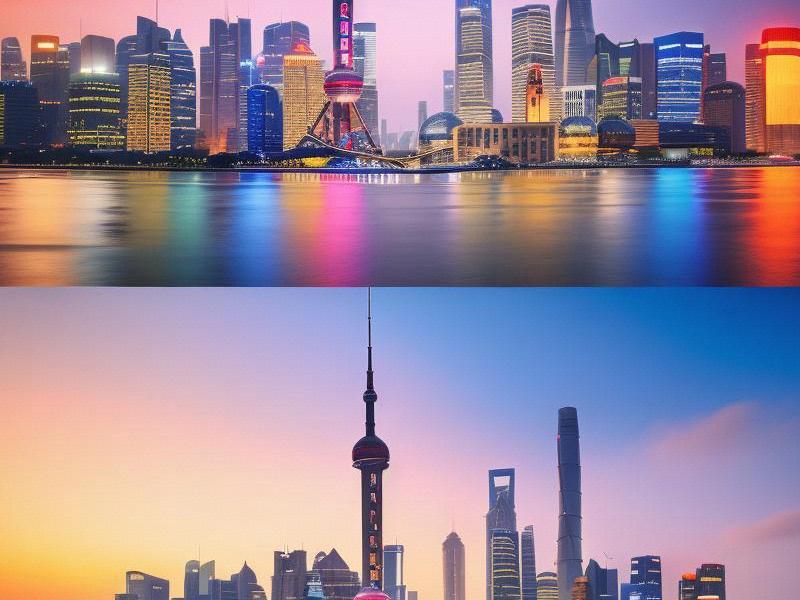This article delves into the ongoing transformation of Shanghai, exploring its journey towards becoming a global city that embodies innovation, sustainability, and a harmonious blend of tradition and modernity. It examines the latest urban development projects, technological advancements, and cultural initiatives that are shaping the city's future.

Shanghai, often referred to as the "Pearl of the Orient," has long been a symbol of China's economic and cultural dynamism. Over the past few decades, the city has undergone a remarkable transformation, evolving from a bustling port city into a global metropolis that is at the forefront of innovation and sustainability. Today, Shanghai is not only a hub for commerce and finance but also a city that is committed to creating a better quality of life for its residents while preserving its rich cultural heritage.
One of the most significant aspects of Shanghai's transformation is its urban development. The city has been at the forefront of China's urbanization efforts, with a series of ambitious projects aimed at creating a more livable and sustainable urban environment. The Bund, once a symbol of colonial Shanghai, has been revitalized into a vibrant waterfront area that combines historical architecture with modern skyscrapers. The iconic Shanghai Tower, the tallest building in China and the second-tallest in the world, stands as a testament to the city's ambition and innovation.
The Pudong area, once a rural hinterland, has been transformed into a modern financial district that rivals the likes of Wall Street and the City of London. The Lujiazui Financial District is home to some of the world's most prestigious financial institutions, while the nearby Century Park is a serene oasis that provides a much-needed escape from the hustle and bustle of city life. The development of Pudong is a prime example of how Shanghai has successfully balanced economic growth with environmental sustainability.
In recent years, Shanghai has also made significant strides in the field of technology and innovation. The city has established itself as a global hub for high-tech industries, attracting some of the world's leading tech companies and startups. The Zhangjiang Hi-Tech Park, often referred to as "China's Silicon Valley," is a major center for research and development in areas such as biotechnology, information technology, and new materials. The park is home to numerous world-class research institutions and universities, fostering a vibrant ecosystem of innovation and collaboration.
上海龙凤419手机
Shanghai's commitment to sustainability is evident in its efforts to promote green energy and reduce carbon emissions. The city has set ambitious targets for achieving carbon neutrality by 2050, and it is actively implementing measures to reduce its environmental footprint. The development of the Jiaotong University campus in Minhang District is a prime example of Shanghai's commitment to sustainable urban planning. The campus is designed to be a model of green architecture, incorporating energy-efficient buildings, renewable energy sources, and smart technologies to minimize its environmental impact.
The city has also been investing heavily in public transportation infrastructure to reduce traffic congestion and improve air quality. The Shanghai Metro, one of the most extensive and efficient metro systems in the world, has played a crucial role in connecting different parts of the city and reducing reliance on private vehicles. The recent introduction of electric buses and the expansion of bike-sharing networks further demonstrate Shanghai's commitment to sustainable transportation.
Culturally, Shanghai is a city that celebrates its rich heritage while embracing the future. The city is home to a diverse range of cultural institutions, including museums, theaters, and art galleries, that showcase its unique blend of tradition and modernity. The Shanghai Museum, one of the largest and most prestigious museums in China, houses an impressive collection of Chinese art and artifacts that span thousands of years. The city's vibrant art scene is reflected in its numerous galleries and cultural festivals, which attract artists and art lovers from around the world.
上海贵族宝贝自荐419
The preservation of Shanghai's historical architecture is another important aspect of the city's transformation. The French Concession, with its charming cobblestone streets and colonial-era buildings, is a testament to the city's rich history and cultural diversity. Efforts have been made to preserve and restore these historic buildings, ensuring that they remain an integral part of Shanghai's urban landscape.
Shanghai's transformation is not without its challenges. The rapid pace of urbanization has led to issues such as housing shortages, income inequality, and environmental degradation. However, the city government has been proactive in addressing these challenges through innovative policies and initiatives. For example, the introduction of affordable housing programs and the promotion of shared economy platforms have helped to alleviate some of the housing pressures. The city's commitment to environmental sustainability is also evident in its efforts to improve air quality and reduce waste.
The future of Shanghai looks bright, with continued investment in innovation, sustainability, and cultural development. The city is well-positioned to become a global leader in areas such as artificial intelligence, green energy, and smart cities. Its strategic location and strong economic foundation make it an attractive destination for businesses, investors, and talent from around the world.
上海喝茶服务vx
As Shanghai continues its journey towards becoming a global city, it remains committed to creating a better quality of life for its residents. The city's efforts to balance economic growth with environmental sustainability and social equity are a model for other cities around the world. By embracing innovation and preserving its rich cultural heritage, Shanghai is setting an example of how a city can thrive in the 21st century.
In conclusion, Shanghai's transformation is a story of ambition, resilience, and innovation. The city has successfully navigated the challenges of rapid urbanization and emerged as a global hub for commerce, finance, technology, and culture. Its commitment to sustainability and social equity ensures that it remains a vibrant and livable city for generations to come. As Shanghai looks to the future, it continues to inspire and captivate the world with its vision of a better tomorrow.